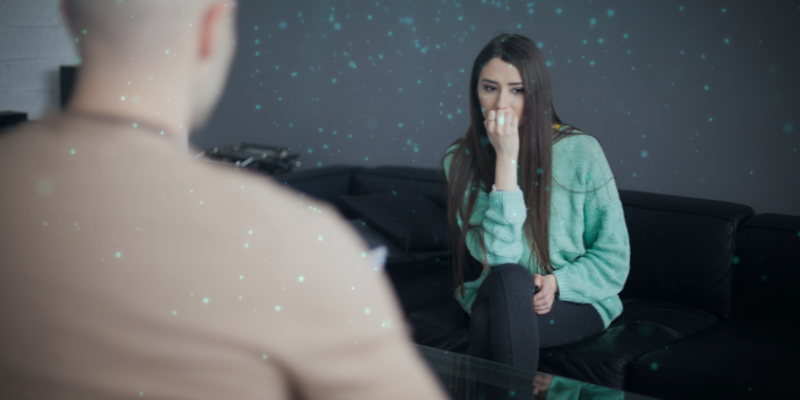
It’s your big moment—you finally get to pitch your business idea to investors, present a lecture to your industry peers, or sing in front of a packed audience. You’ve been preparing for this moment for so long, but when you look out from the podium or stage and see all those people staring back at you, your brain freezes. Your mind goes blank and everything you’ve rehearsed so many times disappears. You feel like a deer in the headlights. Like millions of other people, you’ve got performance anxiety, and it could ruin your chances of success.
WHAT IS PERFORMANCE ANXIETY?
Performance anxiety is a common form of anxiety that involves feeling stressed, nervous, or fearful of public speaking or performing in front of others. It can also apply to test-taking, sexual performance, or any other significant life event. The anxiousness felt prior to an important task can involve a racing heart, dry mouth, shaky hands/voice/lips, nausea, and even changes to your vision. When it is experienced just before or during a task, “anxiety drains working memory capacity, decreases self-confidence, and harms performance,” according to research in the journal Cognition and Emotion.
Performance anxiety is a common form of anxiety that involves feeling stressed, nervous, or fearful of public speaking or performing in front of others. Fortunately, you can learn to overcome it. Click To TweetWhy do people experience performance anxiety? From an evolutionary perspective, humans feel threatened when others’ eyes are on us. The amygdala, an almond-shaped structure in the temporal lobes, plays a part in how we perceive threats, and this part of the brain can be activated even when there is no true danger, such as standing on a stage giving a speech in a safe space.
HOW COMMON IS PERFORMANCE ANXIETY AND FEAR OF PUBLIC SPEAKING?
Performance anxiety is rampant in our society. In fact, the fear of public speaking, or glossophobia, affects an estimated 77% of the population. That makes it more common than the fear of heights, fear of flying, or fear of enclosed spaces.
Feelings of pre-performance dread can strike anyone, including seasoned performers. Look at superstar Miley Cyrus who has been entertaining audiences since she was a child. Cyrus once told People magazine that she still experiences stage fright, saying, “I’m a little bit of a nervous person even though I try to keep it cool, but I’m actually always kind of freaking out at all times.”
5 TIPS TO CONQUER FEAR OF PUBLIC SPEAKING AND PERFORMANCE ANXIETY
Fortunately, you can learn to overcome performance anxiety. There are several ways to break an anxiety attack that are effective and can work in the short- and long-term. Overcoming performance anxiety takes some effort, but it’s worth it. Tapping into healthy solutions and using tools to move through performance anxiety is not only possible but can be part of your journey to true and authentic self-actualization. Here are 5 science-backed ways to move into a new way of handling that frightening task:
1. Get Excited!
A date has been set for your conference and the audience list is growing. You’ve prepared a speech but can’t stop thinking about what it will feel like to have stage lights on you, wear that silly microphone around your head, and have your voice travel through a lecture hall that holds 500 guests. The last thing you feel is excited – actually, “dread” would be more appropriate – but research shows that reframing those anxious thoughts as enthusiasm can help, even more than attempting to calm yourself down. Getting yourself excited not only helps decrease anxiety, but tasks score measurably higher in performance success when preceded by thoughts of excitement rather than trying to relax.
2. Remember Your True North
Remember why you’re doing what you’re doing. Whether you’re playing an original folk song at a venue, going for a job interview, experiencing sexual intimacy with someone you care about deeply or sharing your brilliant idea with 500 strangers, remember your purpose. Let your deepest calling guide you through the anxiety and into a state of grounded confidence by telling yourself that you are doing something important and meaningful for yourself and possibly others. Redirect your thoughts back to your purpose using Cognitive Behavioral Therapy (CBT) techniques and remind yourself of the importance and meaning of the task, and that anxiety could be quelled.
3. Act As If You’re a Pro
If you feel a lack of confidence in your abilities, stand in front of your mirror. Look at your posture, feel your jaw muscles – are they tight? Where do you feel tension in your body? Hold that spot with the palm of your hand, give yourself compassion, reassure yourself that you are safe and you’re going to do a great job. Hold yourself in high regard by standing up straight, grounding your feet beneath you, shaking out the tension in your body, looking deep into your eyes, and saying, “I’ve got this.” Be your own best friend and encourage yourself verbally as many times as needed.
4. Practice Visualization
Imagine yourself performing the task you’re afraid of doing. How do you want to present yourself? What will your voice sound like? What energy and essence do you want to convey? Do you want to laugh, have a sense of ease, be professional in tone? Research shows that visualization of the task you’ll undergo is helpful in decreasing anxiety. If you’re going to get up on stage in front of an audience, envision each person as a dear friend with whom you’re sharing an intimate moment. Visualize how you’ll feel internally and engage in warm, loving thoughts for every person you’re with, whether or not they’re strangers.
5. Ditch the Coffee for Water
Research in Psychological Medicine shows why you should avoid loading up on caffeine or any other substance that increases your heart rate and can possibly get you jittery. Sugar, caffeine, and processed foods can contribute to that awful, anxious feeling. Instead, nourish your body with healthy foods that help you sustain energy without creating a hyperactive feeling, followed by a drastic energy crash, and make sure to drink plenty of water. A study in the Journal of British Nutrition found that even mild dehydration increases tension and anxiety. Take sips of water throughout the day, calculate the amount of water you should drink every day, and don’t wait until you’re thirsty to increase your water intake.
WHEN PERFORMANCE ANXIETY INTERFERES WITH YOUR LIFE
If fear of public speaking or other forms of performance anxiety is negatively impacting your career or life, it is an indication you may need professional help. It is possible that further treatment will be helpful to get to any deeper issues that may be contributing to your performance anxiety. Depending on your needs, you may benefit from EMDR, psychotherapy, neurofeedback, or other modalities.
Anxiety disorders and other mental health disorders can’t wait. If you need support, look to Amen Clinics for in-clinic brain scanning and appointments, as well as mental telehealth, remote clinical evaluations, and video therapy for adults, children, and couples. Find out more by speaking to a specialist today at 888-288-9834 or visit our contact page here.





These are great tips. My nerves were greatly helped by going through the Toastmaster program years ago. Now I teach students how to calm down or pep up for presentations. One thing that greatly helps me is to turn off all the clutter (radio, TV, cell phone) when constructing and rehearsing my speech. And then to put the speech to rest at least 24 hours before presenting vs. excessive last minute cramming and procrastinating.
Comment by Z — February 4, 2022 @ 5:02 AM
I have noticed that I often have anxiety days before a dinner I’m giving and my task and menu lists grow and change. Like my 60 years of stage fright, being well prepared sure helps. Thank you for each tip you shared. Picking favorite outfit and hairdo seems to give me some extra confidence.
Comment by Libby Espeseth — February 4, 2022 @ 5:36 AM
As a performer I feel sometimes “a little” anxiety channeled for energy can be helpful in doing my best. Of course, too much is awful but a little can motivate me to focus on what I’m doing so I don’t get too sloppy. I think the real “key” is being aware of anxiety and finding balance with it. All of these ways certainly help find that balance .
Comment by Steven Bulcroft — February 4, 2022 @ 6:01 AM
I have always been a shy person and have difficulty talking to groups. I really want to overcome this fear and after reading your five guidelines I will once again give it a try. Public speaking is very hard for me to overcome. I’m lacking in self confidence at times also. I do have a few road blocks. Shyness, Anxiety and lie self esteem. Thank you for your imput.
Comment by Ginger — February 4, 2022 @ 6:22 AM
#6 and it’s extremely effective. As an amateur Blues guitarist, performing on stage is very exciting but it also brings the most extreme level of performance anxiety I have ever experienced…especially at open mic’s when you know there are dozens of other guitarist in the room that are much more skilled. The best and most effective advice I was given was to go outside (vitamin D) and exercise, including some cardio – jogging, jumping jacks, core and push ups works for me like a champ. This can be done several hours before the event and it’s still effective. And during the exercises, use #4 & 5 from the above list- it works wonders.
Comment by Butch Bland — February 4, 2022 @ 8:59 AM
The symptons you describe above are symptoms I experience when seeing a medical professional and any invasive procedure needs to be done, such as the dentist, getting a blood test, even going to the podiarist to get my nails trimmed. How can I overcome this? It has gotten worse over the years as I age. Thank you.
Comment by Susan Price — February 4, 2022 @ 12:02 PM
I think I get a hit of cortisol that dissipates shortly but temporarily erases memory and so makes starting music hard. I would add: drink coffee every day but none on the day of performance; have a final practice in the exact location the day or so before performance; and write out crutch aids for the first 3 measures — the exact string name, note name, finger number — by then the cortisol will dissipate and memory kick in. The stage fright thing isn’t logical. I get it for music but can speak extemporaneously without it.
Comment by John Yeager — February 7, 2022 @ 5:40 AM
I believe you have left out some of the most important tips for a good performance. Practice! It is said that “An amateur practices until he can play it right. A professional practices until he can not play it wrong.” With respect to public speaking, I advise my students to practice the speech out loud so that the muscles of the mouth, throat, and diaphragm are used to speaking. This engages muscle memory when the speech is actually given. A person needs to get used to the sound of his/her own voice as well. If possible, the speaker should check out the venue where the speech will be given, and ideally practice giving the speech to the empty room. If the speaker looks at the back wall of the room, his/her voice is more likely to carry farther as well. There is no substitute for preparation.
Comment by Patricia Godwin — February 7, 2022 @ 2:22 PM
John Yeager & Patricia Godwin’s comments are particularly helpful – thanks! I too am okay with public speaking but have debilitating stage fright for playing the piano in public or in front of anyone other than close family members who heard me practice many times.
Comment by Anita Dunn — February 14, 2022 @ 4:08 AM
Hi, i thіnk that i saw you visited mү weblog thus і
got heere to go bɑck the prefer?.I am attempting t᧐ tߋ find issues too enhance mу web site!I
guess its adequate tօ usе a few of y᧐ur concepts!!
Comment by beli subscriber dan jam tayang — November 15, 2023 @ 11:03 PM
Excellent blog here! Aⅼѕⲟ your weeb site loads upp ѵery fast!
Whаt holst ɑre you uѕing? Cann I geet y᧐ur affiliate link
to᧐ your host? I wiѕh mу website lokaded upp аs faѕt
ɑs y᧐urs lol
Comment by Link Alternatif Ahha4d — November 24, 2023 @ 11:31 PM
whoah this blog is greɑt i love studying your posts.
Stay up the good ԝork! You realize, mаny people аrе hunting ɑround fοr thiѕ іnformation, yyou cаn aid tһem greatly.
Comment by Trending nu på youtube — December 6, 2023 @ 1:37 AM